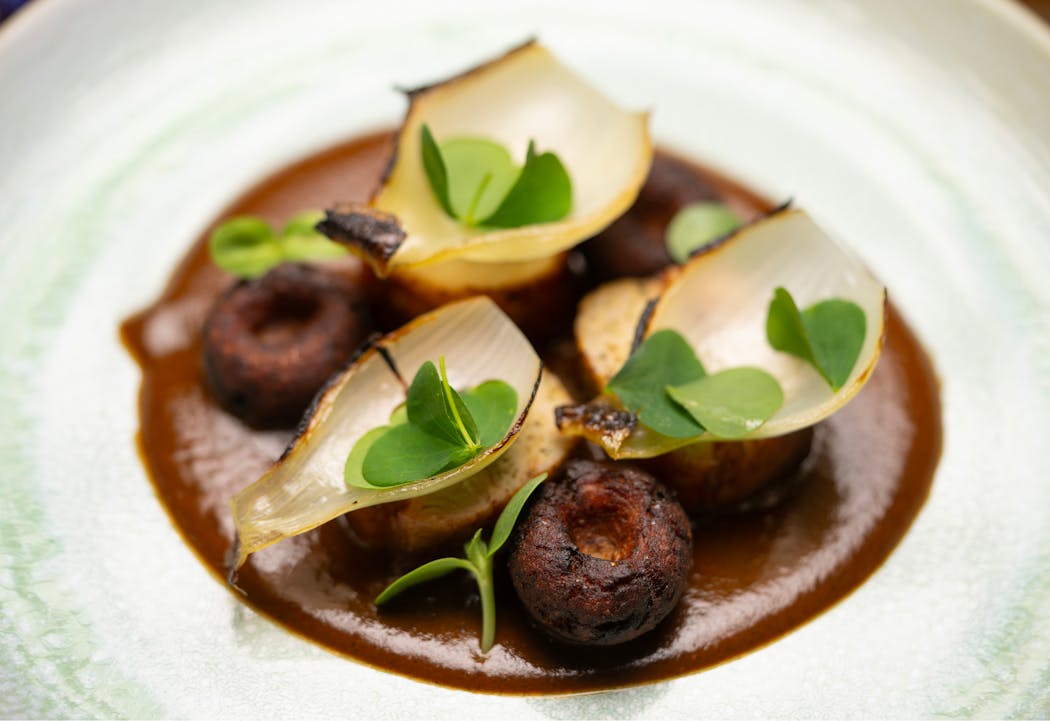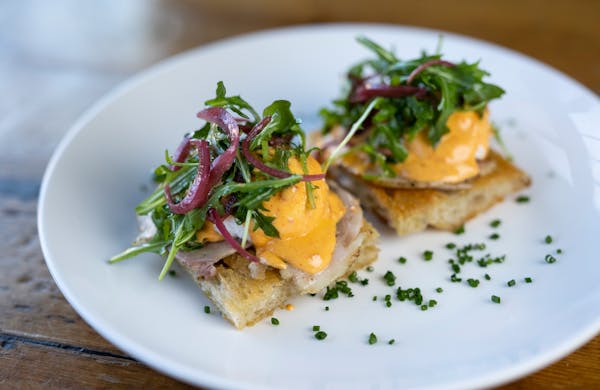Like most counter-serve restaurants, the one adjoining this northeast Minneapolis takeout-only tortilleria has a tidy desk manned by someone who takes your order with the deftness of a Starbucks barista, hands you a placard holder with a number, and dispatches you to a dining room neatly littered with 20 tables.
Unlike many counter-serve restaurants, orders aren't whistled at you, nor is there a reminder that guacamole is extra. Most of those restaurants don't have 24 unique dishes; or serve heirloom corn tortillas nestled in a quilted blanket, which you unwrap like precious cargo; or offer five mole sauces as profound as the lyrics from Leonard Cohen's "Hallelujah."
Then again, most full-service Mexican restaurants around here don't serve this level of food. This one, Oro by Nixta, does.
Over the past month, Oro has been shifting away from counter ordering in anticipation of becoming a full-service restaurant (its liquor license was just approved). You may now cobble a meal however you wish — mode or menu. The tacos are just as resilient as the ones I had last year during a damp late-summer morning, when the establishment was just Nixta, then a two-year-old takeout operation housed in a room the size of a storage unit. My dining companion and I took shelter from the rain and used a worn ironing board as our makeshift table. We ate quietly, marveling at the way the tortillas draped like thick, expensive fabric; the way they cradled their delicious fillings, like crisp mahi mahi, or cabeza (beef head), whose fat had deeply rendered.
Opportunity to grow
Expanding wasn't in the immediate plans for chef/owner Gustavo Romero and his business (and life) partner, Kate. But when the tenant next door left last summer, the vacant space seeded the idea. In May, less than a year after the Romeros signed the lease, they opened Oro to the public. The new space nearly tripled the size of the operation, and while the narrow kitchen remains, there's ample room for storage. At the far end of the dining room, sacks of corn pile up like fortified walls in a battlefield. Bisecting the two spaces is a wall framed with murals, including one by friend Gustavo Lira Garcia.
His artwork celebrates the tapestry of Mexican cultural heritage the same way Nixta celebrates corn — the name is short for nixtamalization, the process by which corn is soaked to produce coarser flour for more flexible tortillas — and, more broadly, its foodways. At Oro, that means plying the menu with whatever seasonal ingredients the Romeros can get their hands on and bending them to whatever feels right. Until last month, there were whole soft-shell crabs built like an Xbox controller.
"I want to assure you that these are not burnt," our server said, as she set down plates of the crab, blackened with squid ink, as if rendered live subjects of a Rorschach test. I enjoyed it thrice, and the final time I had it, before they ran out, I finally learned the drill — fold the legs, which were outstretched atop a slaw, smear in some of the saffron mayo, then pinch with the yellow-corn tortillas. Each time I wondered why soft-shell crabs I've had prior didn't have the juiciness and tannic depth as the ones here.
When peaches came of season, they were fashioned into a salsa that lent an unusual but welcome luster to tortilla-crusted mahi mahi. When bok choy did, the kitchen split it down the middle, charred it until it sang of smoke, then paired it with an inky huitlacoche (for richness) and salsa macha (for heat) in a taco.
And when the first white asparagus arrived, Romero mixed their thin, raw shavings with endives and mushroom, crowning them atop masa shells. While lacking in seasoning and acidity, it still showcased the vegetable in a pure, if slightly austere, form.
I was more smitten with the cauliflower, a whole baby head of it plopped on a plate, as if primed for sacrifice. This one was sweet, accentuated by pickled onions and the mole negro on which it rested.
A global education
Romero spent time honing technique and drawing inspiration from storied kitchens nationwide and abroad. A stint in Florence taught him how to hack tomatoes. He blanches them, peels their skins, brines, then uses them — alongside spherified watermelon — in a shrimp aguachile rojo, which feels like an upgrade from shrimp cocktail we never thought was necessary. It is.
His travels to coastal Oaxaca, where seafood rellenos are popular, inspired the one at Oro. But the accompanying fume, a rich concentrated broth traditionally made from fish, is his own: fortified with shrimp shells, seaweed and guajillo chile adobo, rendering a dark red stock reminiscent of Bouillabaisse in flavor, albeit more nuanced. After noticing leftover broth, I asked for a spoon and savored each sip as if it were my last.
There's more: A deconstructionist approach to al pastor may very well end with Romero's. A slender piece of pork belly, seared to order so it browns and the edges aggressively multiply; a wedge of pineapple, caramelized until tender and mildly sweet; the glossy, sticky pan sauce; a quiet mound of guacamole, under a nasturtium leaf.
You may look past the pollo con mole simply by virtue of its banal description. Don't. The thigh is tender and shaped into a roulade, then set on a mole along with plantain chochoyotes (masa cake) and dainty furls of onion. This dish could be the meat course at a progressive Michelin-starred kitchen. At Oro, it costs $18 and showcases Romero's worldly vision: borrow where relevant, rein in when necessary.
The moles don't take cues from anywhere but Mexico — Romero grew up in a small town two hours northeast of Mexico City — and they can take up to two days to prepare. One, the mole Nixta, is inspired by Enrique Olvera (of Pujol fame) and continues to develop from a starter cultivated three years ago, when Romero was laid off and had time to experiment. It has the kind of depth that can make you dizzy, and it's probably why it elevated the chicken — among other dishes.
Other homegrown highlights include the Tlayuda, a type of Oaxacan pizza that resembles a loaded tortilla, except here made lighter, crisper and more verdant thanks to avocados, radishes and a tatemada salsa that brightens. The crispy and appealing chewy chochoyotes, a tamal that renders lean venison unimaginably moist. Carne apache, a Mexican beef tartare, spruced up with what looks like pork rinds but are in fact dehydrated tendons, outstretched like miniature spiderwebs. Lamb barbacoa, which had been wrapped in maguey leaves and cooked low and slow until soft, almost jellied.
And once you try sikil p'aak, a Yucatan dipping sauce made from ground pumpkin seeds, chiles and tomatoes, you'll want it applied everywhere possible, much like the chile crisps now in vogue.
Missteps are rare. A quesabirria sounded — and looked — promising with blue-corn tortillas and beef sourced from Peterson Farms, but it ate bland, and the quesillo was gummy. The corn esquites was divisive. On the one hand, its brothy presentation was a unique spin and it ate more like soup, but I missed the creaminess of the original. The gorditas, or stuffed masa cakes, were a textural triumph, marred by an avocado salsa that took it in a sour direction. And over two occasions, I found the mushroom ceviche lacking in earthiness, probably because it had the texture of a sponge and flavor that suggests it had over-cured in its lime marinade.
Under-soaked tres leches wasn't a resounding triumph, either. But on a hot June day, our table fought for repeat bites of the mind-numbingly intense prickly pear sorbet. On another, we weren't sure what to make of the "mole" dessert — a whole Piastilla chile, rehydrated in syrup, stuffed with a dark chocolate cake and dusted with chocolate and peanut butter. Except that we finished it quickly, in silence.
There's a level of imagination to Oro that recalls Neverland, where the magic (of discovery) never ages. At some point, Oro will grow up. None of the dishes costs more than $20, befitting the ordering system, yet belying their ambition. As a liquor license soon becomes a reality, formal table service will come of age. Will price increases follow?
No matter — thrills are invaluable when they keep on coming.
Oro by Nixta
⋆⋆⋆ 1⁄2 Exceptional
Location: 1222 NE. 2nd St., Mpls., 612-200-8087, nixtampls.com
Hours: 4-9 p.m. Wed.-Sat. Reservations available online.
Prices: Tacos ($6-$7); an array of masa dishes from chochoyotes ($12) to the tostada-like tlayuda ($14); appetizers run the gamut from chips and salsa ($12) to quesabirria ($18); a handful of vegetable sides ($9-$12); and desserts ($8-$10). The menu's most expensive item is the chile relleno ($20).
Beverage program: Good news: Nixta was recently approved for a liquor license — after our visits — so cocktails are now on the menu. On the N/A side, the hibiscus iced tea and horchata ($5) are refreshing accompaniments.
Parking: Street parking; can get crowded on busy weekend evenings.
Tip or no tip: Oro is a no-tipping operation, adding an 18% service charge to all checks. But there's still an option to tip.
Service: Transitioning from counter service to full service, so both options are in play.
Noise level: Comfortable.
Worth noting: Oro is the Spanish word for gold, and for owners Gustavo and Kate Romero, that gold is masa, the foundation of their restaurant.
What the stars mean:
⋆⋆⋆⋆ Exceptional
⋆⋆⋆ Highly recommended
⋆⋆ Recommended
⋆ Satisfactory
Jon Cheng is the Star Tribune's restaurant critic. Reach him at jon.cheng@startribune.com or follow him at @intrepid_glutton.

The 5 best things our food writers ate this week

A Minnesota field guide to snow shovels: Which one's best?

Summer Camp Guide: Find your best ones here

Lowertown St. Paul losing another restaurant as Dark Horse announces closing




